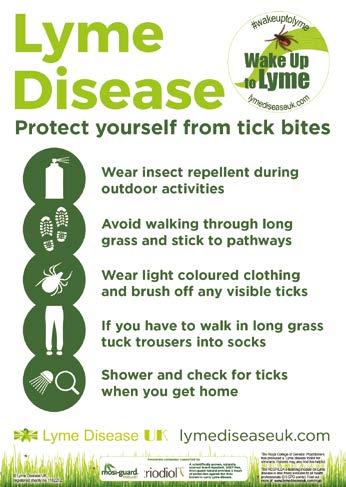
2 minute read
Wake Up Lyme
by TheDever
destination. The refund includes any onward flights and money for a return flight if you’re part-way through a connecting journey. Ask about this at the airport if you can. Don’t just rebook another flight yourself–check with the airline first because it’s their responsibility to sort out your replacement. If you do have to rebook it yourself, keep any receipts and evidence of why the airline couldn’t do this for you, for example screen-shots of live chats. If the cancellation ends up delaying you getting to your holiday by two or more hours, you’re entitled to help with costs. Check if you’re entitled to compensation for a delayed or cancelled flight. Again, this will depend on how long the delay was, the distance, and whether it’s the airline’s fault.
The Citizens Advice website has details on claiming compensation for delays or cancellations from the airline. You might also be able to claim from your travel insurance – check if your policy covers this.
Advertisement
If you have a problem with an airline and you’re not sure what to do, call the Citizens Advice consumer helpline on 0808 223 1133 or call to speak to a local adviser on 0808 278 7861.
Protect your pets from tick bites
Protect your pets from tick bites
Lyme disease is spread to humans and animals by the bite of an infected tick. The best way to protect your pets is by avoiding tick bites.
Lyme disease is spread to humans and animals by the bite of an infected tick. The best way to protect your pets is by avoiding tick bites.

• Prevent ticks from attaching to your pet to reduce the risk of contracting Lyme disease
Pr our pet to reduce the risk of cont
Talk to your vet about tick prevention products for pets.
Talk to your vet about tick prevention products for pets.
Check your pet for ticks being outdoors
• Check your pet for ticks every day and after being outdoors
Daily checks are important because your pet is unlikely to notice an attached tick or bite. Tick bites are not itchy and tend to be hidden by fur or inside the ears or mouth. icks often attach to the head, neck, ears, bellies and paws of dogs and cats.
Daily checks are important because your pet is unlikely to notice an attached tick or bite. Tick bites are not itchy and tend to be hidden by fur or inside the ears or mouth. Ticks often attach to the head, neck, ears, bellies and paws of dogs and cats.
• Carefully remove attached ticks immediately with a tick removal tool
Carefully rem e attached ticks immediately with a tick rem
The longer a tick is attached to your pet, the more likely it is to transmit the bacteria that can cause Lyme disease. Remember to keep yourself safe from bites by not handling ticks with bare hands. Seek advice from your vet if you are unsure how to remove a tick safel
The longer a tick is attached to your pet, the more likely it is to transmit the bacteria that can cause Lyme disease. Remember to keep yourself safe from bites by not handling ticks with bare hands. Seek advice from your vet if you are unsure how to remove a tick safely.
Check yourself and your family for ticks
• Check yourself and your family for ticks
If you are finding ticks on your pets, you are also at risk of tick bites. ear insect repellent during outdoor activities. Avoid walking through long grass and stick to pathways. If you have to walk in long grass tuck into socks. Shower and check for ticks when you get home.
If you are nding ticks on your pets, you are also at risk of tick bites. Wear insect repellent during outdoor activities. Avoid walking through long grass and stick to pathways. If you have to walk in long grass tuck trousers into socks. Shower and check for ticks when you get home.


